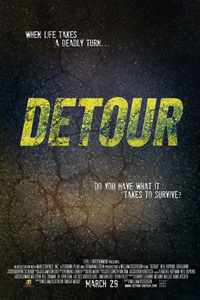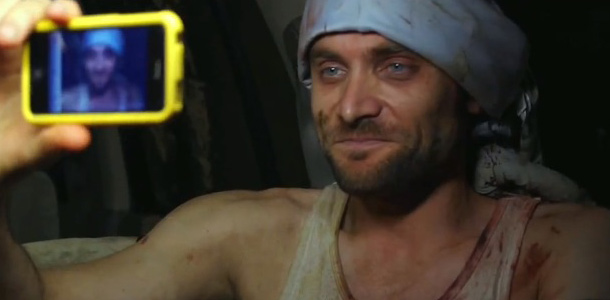Reviews
Detour | Review
Dickerson’s Trapped-without-escape Ordeal Swims More Than Sinks
 Utilizing a minimum amount of characters and locations within a trapped in a car, freak mudslide buried alive template, William Dickerson’s debut feature draws inevitable comparisons to the stuck between a rock and a hard place denouements recently pitched in Rodrigo Cortés’ Buried and Danny Boyle’s 127 Hours. Detourhas, literally, more space to play with than its predecessors by presenting auds with a more familiar setting of the automobile, but while the ubiquity of a car enhances the idea of “this could happen to anyone”; such “familiarity” pretends to make this an even more terrifying experience than it really is.
Utilizing a minimum amount of characters and locations within a trapped in a car, freak mudslide buried alive template, William Dickerson’s debut feature draws inevitable comparisons to the stuck between a rock and a hard place denouements recently pitched in Rodrigo Cortés’ Buried and Danny Boyle’s 127 Hours. Detourhas, literally, more space to play with than its predecessors by presenting auds with a more familiar setting of the automobile, but while the ubiquity of a car enhances the idea of “this could happen to anyone”; such “familiarity” pretends to make this an even more terrifying experience than it really is.
Jackson Aider (Neil Hopkins) is a typical out-of-state transplant that has come to California to find luck in the entertainment industry. Now working in advertisement, Jackson lives with his pregnant wife in Los Angeles. An ordinary existence until one rainy day, driving to a meet a client for lunch, a mudslide catches him by surprise and buries him, car and all, on the side of cliff. From this point on Jackson will rediscover himself as a vulnerable man who can only be saved by his own instincts. Aided by an array of specifically placed instruments, Jackson must manage to stay alive and keep the roof of his car from collapsing. His sanity, simultaneously at stake, will be tested by self-doubt, a makeshift prayer location (a cross drawn in the back of a seat), and the fear of not getting to meet his firstborn child.
Dickerson is smart enough to take advantage of different cinematic devices to maintain a certain level of interest in his story. The many iPhone-induced flashbacks serve as a testimony for the new digital collection of memories people carry, as well as impromptu testament for Jackson’s family in case of death. These, combined with the hallucinations Jackson experiences, paint a deeper picture of the man’s personality. Something hard to achieve when the lead character spends the entire film in the depths of the mountains. Despite the limitations, the highlight here is Hopkins’ performance, a crucial decision for the director since one actor carries the entire feature on his shoulders. Hopkins unfolds a multi-layered role that expands from complete hopelessness to radiant determination to survive, which is in turn spiced with a healthy dose of sarcasm and an irreverent sense of humor given the situations the character must go through.
Nonetheless, even with Dickerson’s inventiveness to create peculiar feats for Jackson to prevail, the film oversimplifies the experience via an easily redemptive conclusion. It is hard to determine what the purpose of the filmmaker really was. It provides hints of wanting to be an uplifting drama at times, but then the surreal fantasies provide some darker overtones that don’t always feel in sync with the rest of the film. Probably even more distracting are the in-your-face guilt trips provided by the recurrent cell phone interventions, as if to remind the audience “hey, you should care about this guy, he has a wife of whom he has videos on his phone”.
Detour doesn’t carry the DNA of one of those overpowering viewing experiences — it simply doesn’t have that emotional scope. However, Dickerson has filled a void in the trapped-without-escape niche of films, cars can now be seen as deathtraps for a different reason than a regular traffic accident. Entertaining enough to keep the audience engaged, the film is clearly a less developed piece than its big budget counterparts, not for lack of Reynolds or Franco, but for the absence of a powerful human connection.
































